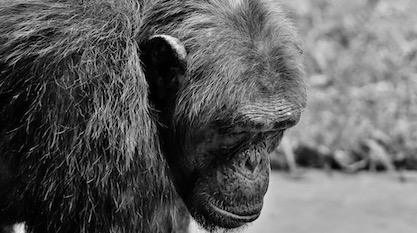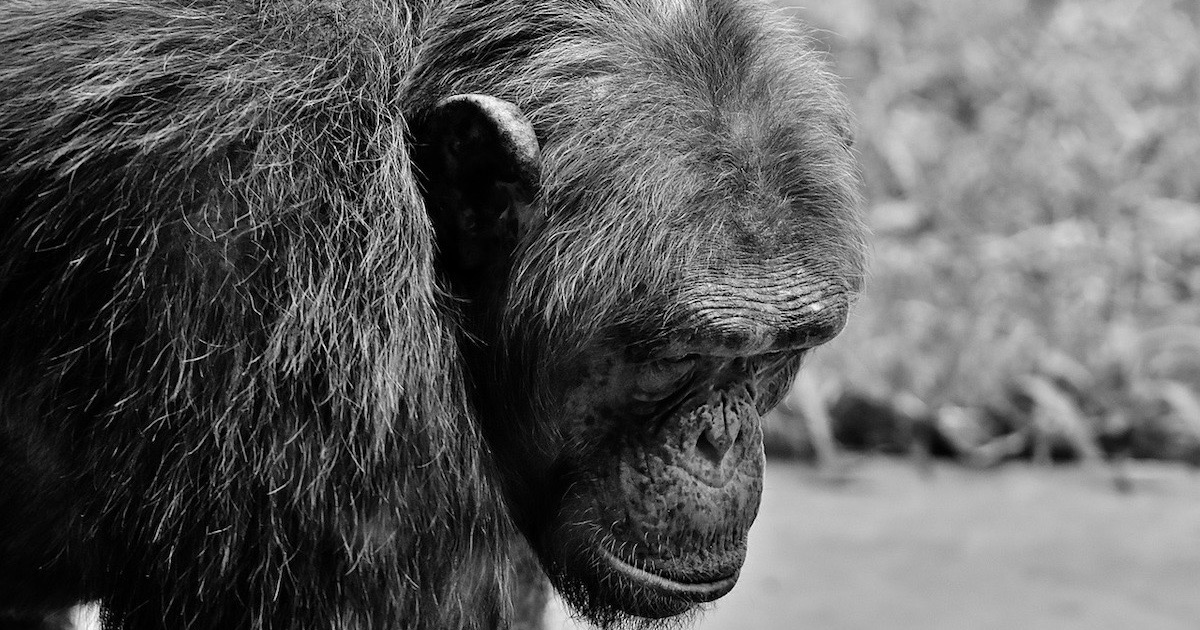 Evolution
Evolution
 Faith & Science
Faith & Science
 Life Sciences
Life Sciences
David Barash’s Proposal — Something Wicked This Way Comes


If you want to see something creepy, read the article in Nautilus by David Barash, that Wesley Smith and Richard Weikart have already noted. The face that stares out is a chimp/human chimera, thankfully still fictional. But if David Barash, emeritus professor of psychology at the University of Washington, has his way, chimeras will soon be a reality.
Human/animal chimeras are not new. Human pluripotent stem cells have been added to mouse, cow, and pig embryos already, and the results were published in the journal Cell in 2017. In the biggest experiment, the researchers successfully created pig/human chimeras and implanted them in female pigs. They terminated them after 28 days because of ethical concerns.
Indeed, there is an instinctive abhorrence about mixing animal and human cells. Letting such a part-human creature come to term would be monstrous. “The idea of having an animal being born composing [sic] of human cells creates some feelings that need to be addressed,” Izpisua Belmonte told Hannah Devlin at The Guardian.
Why do this research at all? Lead researcher Izpisua Belmonte said, “This provides us with an important tool for studying species evolution, biology and disease, and may lead ultimately to the ability to grow human organs for transplant.” That does not make it moral, however.
No restrictions exist in federal law. Fortunately, the U.S. National Institutes of Health do have a regulation in place. Barash says, “Currently prohibited — and likely to remain so — is funding for studies that involve injecting human stem cells into embryonic primates, although inserting such cells into adults is permissible…. All sorts of things can be done; whether they should, is another question.” (Emphasis added.)
That sounds like a reasonable point of view. But in the very next paragraph, he says:
I propose that generating humanzees or chimphumans would be not only ethical, but profoundly so, even if there were no prospects of enhancing human welfare. How could even the most determinedly homo-centric, animal-denigrating religious fundamentalist maintain that God created us in his image and that we and we alone harbor a spark of the divine, distinct from all other life forms, once confronted with living beings that are indisputably intermediate between human and non-human? [Emphasis added.]
David Barash wants to see chimp/human chimeras brought face to face with humanity to force us to acknowledge that humans are not in any way exceptional. His rage against religion is clear:
…the nonsensical insistence that human beings are uniquely created in God’s image and endowed with a soul, whereas other living things are mere brutes has not only permitted but encouraged an attitude toward the natural world in general and other animals in particular that has been at best indifferent and more often, downright antagonistic, jingoistic, and in many cases, intolerably cruel…. It is only because of this self-serving myth that some people accord the embryos of Homo sapiens a special place as persons-in-waiting, magically endowed with a notable humanity that entitles them to special legal and moral consideration unavailable to our nonhuman kin.
Perhaps not surprisingly, Richard Dawkins has said equally strong things about human exceptionalism. The Guardian reproduced the results of “Edge.org’s annual New Year challenge to the world’s leading thinkers.” The question was, “What will change everything?” and his answers included “successful hybridization between a human and a chimpanzee.”
Our ethics and our politics assume, largely without question or serious discussion, that the division between human and ‘animal’ is absolute. ‘Pro-life’, to take just one example, is a potent political badge, associated with a gamut of ethical issues such as opposition to abortion and euthanasia…
In the minds of many confused people, a single-celled human zygote, which has no nerves and cannot suffer, is infinitely sacred, simply because it is ‘human’. No other cells enjoy this exalted status.
But such ‘essentialism’ is deeply un-evolutionary.
Dawkins expands on the ways human exceptionalism can be shown to be wrong. I will list only the first three:
- The discovery of relict populations of extinct hominins such Homo erectus and Australopithecus. Yeti enthusiasts notwithstanding, I don’t think this is going to happen. …
- A successful hybridisation between a human and a chimpanzee. Even if the hybrid were infertile like a mule, the shock waves that would be sent through society would be salutary. …
- An experimental chimera in an embryology lab, consisting of approximately equal numbers of human and chimpanzee cells.
Indeed, Barash’s justification for his belief in the viability of chimeras is similar: evolutionism.
There is an immense pile of evidence already demonstrating continuity, including but not limited to physiology, genetics, anatomy, embryology, and paleontology, but it is almost impossible to imagine how the most die-hard advocate of humans having a discontinuously unique biological status could continue to maintain this position if confronted with a real, functioning, human-chimp combination.
Despite Barash’s claims, the likelihood of being “confronted with a real, functioning, human-chimp combination” is low because full-fledged human/chimp embryos are unlikely to develop. Varki and Altheide report a 4 percent difference in the DNA sequences of chimps and humans, with many of those differences being significant, especially in the brain. Another study estimates as much as 17.4 percent of gene networks in the cortex of the brain are specific to humans compared to chimps, significantly more than would be expected from a simple 4 percent DNA difference. Then there are cell surface differences, differences in infant development, differences in reproduction, physiology, and the immune system, just to name a few. In fact, chimps do not make a good medical model for human beings, for we do not get the same major diseases.
Is Barash ignorant of studies like these, or is he so convinced of the justice of his position that he rejects anything that does not fit his paradigm? He continues his campaign, in any case:
It is only because of this self-serving myth [of human exceptionalism] that many people have been able to deny the screamingly evident evolutionary connectedness between themselves and other life forms.
Barash thinks his is a noble cause — to make us see the truth about our selves, that we are only animals. But does he see the truth about himself? In a very telling paragraph he explains why making chimeric human/chimp creatures in the lab is all right.
But what about those presumably unfortunate individuals thereby produced? Neither fish nor fowl, wouldn’t they find themselves intolerably unspecified and inchoate, doomed to a living hell of biological and social indeterminacy? This is possible, but it is at least arguable that the ultimate benefit of teaching human beings their true nature would be worth the sacrifice paid by a few unfortunates.
In Barash’s own words, chimeras could be “intolerably unspecified and inchoate, doomed to a living hell of biological and social indeterminacy.” But it would be worth their sacrifice to teach us all a lesson.
What about the lessons learned at Dachau and Auschwitz? One of the Mengele twins, victims of Nazi experimentation said this:
We were treated like animals — we were his guinea pigs. But it hurts 10 times more today to realize that some American scientists and doctors want to use this data regardless of the pain and suffering paid by the victims. The advocates for the use of the data claim they want to save human lives. It is obnoxious to me that some of the advocates are so magnanimous with other peoples’ lives and suffering.
This might very well be the attitude of any chimera created solely because of David Barash’s agenda.
Surprisingly, Barash himself is not unaware of the dangers. He opens his article by recounting the lesson of Mary Shelley’s Frankenstein. “Haven’t we learned that Promethean hubris leads only to disaster, as did the efforts of the fictional Dr. Frankenstein?” Barash asks. Answering himself, he says it will still be worth Promethean hubris to teach us we have no souls. I think David Barash has learned the wrong lesson.
Photo credit: Alexas_Fotos, via Pixabay.
